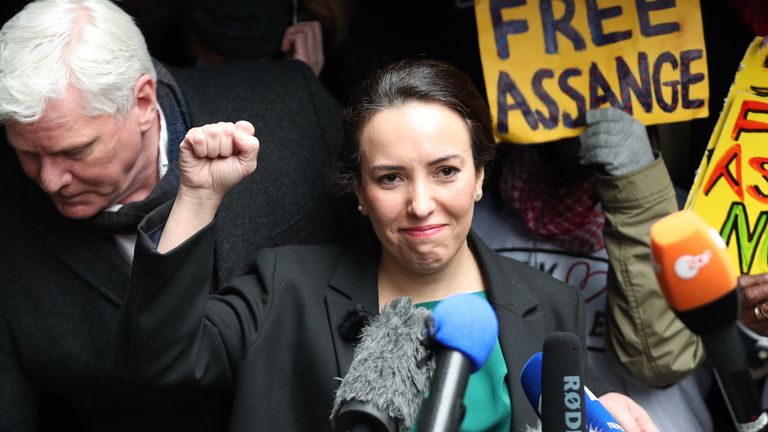Julian Assange denied bail by London court
WikiLeaks founder Julian Assange has been denied bail by a London court.
It comes after his extradition to the US was blocked over concerns about his mental health.
Assange, 49, has not been seen in public as a free man since June 2012 when he rang the doorbell of the Ecuadorean embassy in London and asked for sanctuary.
He had just lost a final battle against extradition to Sweden on rape charges, which were later dropped, and was running out of options.
He was given political asylum by the Ecuadorean president which prompted a diplomatic row with the UK, though after seven years he became an unwelcome house guest and Scotland Yard officers were invited into the embassy to arrest him.
The last time Assange was seen on a London street was in April 2019 – being carried out, dishevelled, full-bearded and protesting by police ahead of a 50-week jail sentence for jumping bail in 2012.
Supporters had gathered in the rain to await the outcome of today’s bail hearing, though COVID restrictions kept many more away.
Police made a token effort to enforce social distancing, as they had tried to do so outside the Old Bailey court 48 hours earlier when judge Vanessa Baraitser ruled he shouldn’t be extradited to the US on spying and computer hacking charges.
The Americans claim Assange’s receipt and publishing of tens of thousands of classified military and diplomatic documents about the Iraq and Afghanistan wars put lives in danger.
The raw data appeared on the WikiLeaks website in 2010, while edited versions were published in newspapers, including the UK’s Guardian.
US prosecutors indicted Assange on 17 espionage charges and one charge of computer misuse over WikiLeaks’ publication of the leaked documents.
He was rearrested in September over the charges, which carry a maximum sentence of 175 years in prison.
Assange and his lawyers fought US extradition, arguing that he was no more than an investigative journalist and his treatment so far had so damaged his mental health it had made him suicidal.
On Monday the judge rejected his main defence, ruling that he had sacrificed the safety of others in the name of free speech. She believed he would get a fair trial in the US.
But she agreed that isolation in a maximum security US jail “would not prevent Mr Assange from finding a way to commit suicide”.
She said such incarceration had not been enough to stop the apparent suicide of Jeffrey Epstein, the notorious American financier and sex offender found hanged in his New York cell 17 months ago.
But Assange’s escape from extradition was hardly the victory for free speech that he and his supporters had hoped for.
His fiancee Stella Moris told Good Morning Britain TV today that until Monday’s extradition ruling, she had not seen Assange, the father of her two young children, since October because of a COVID outbreak at Belmarsh prison where he has been held in custody.
The US government is to appeal the extradition block.
Source: Read Full Article




